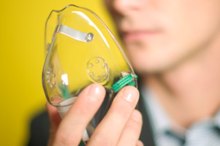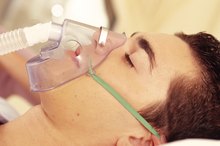Side Effects of Using a BiPAP Machine
Sleep apnea obstructs airway flow and impairs your ability to get restorative sleep, according to the American Sleep Apnea Association. Untreated sleep apnea can lead to headaches, high blood pressure and mental impairment that can impact everything from driving to doing your job. A Bilevel Positive Airway Pressure Machine (BiPap) provides pressurized air during the night using a mask, and monitors breathing via an electronic circuit. The most common side effects of using a BiPap are treatable and mild.
Skin Irritations
A BiPap mask that does not fit well can cause a lot of discomfort and even lead to feelings of numbness or skin irritation, according to the Society of Critical Care Medicine's website ICU-USA.com. The website sleep-apnea-cpap-machine.com emphasizes the importance of working with your doctor to ensure your mask fits tightly yet comfortably. Although rare, an ill-fitting mask can lead to skin sores at pressure points where the mask makes contact with your skin.
Bloating
How to Troubleshoot a ResMed CPAP
Learn More
Visible bloating in the stomach that results from swallowing excess air through the BiPap is another complication that can arise, although the website impactednurse.com states it is not very common. The website indicates that stomach aches, nausea and even vomiting are possible when gastric bloating happens. CPAP.com recommends changing your sleep position to help remedy this problem 1. Try removing your pillow, shifting to the side or to your back or elevating your head. If changing your position doesn't work, your doctor can work with you to adjust the machine's pressure levels.
- Visible bloating in the stomach that results from swallowing excess air through the BiPap is another complication that can arise, although the website impactednurse.com states it is not very common.
Dryness
Many complain about side effects associated with breathing extremely dry air night after night using the BiPap machine. Dried, chapped lips and even nosebleeds can result. While lip balm will help remedy the chapped lips, using a humidifier or purchasing a BiPap machine with a built-in humidifier appears to alleviate the dryness of the nasal passages that leads to nosebleeds. The website of Sleep Medicine Associates also recommends using nasal saline spray to keep the nostrils and nasal passages moist.
- Many complain about side effects associated with breathing extremely dry air night after night using the BiPap machine.
- While lip balm will help remedy the chapped lips, using a humidifier or purchasing a BiPap machine with a built-in humidifier appears to alleviate the dryness of the nasal passages that leads to nosebleeds.
Related Articles
References
- Panchabhai TS, Mireles cabodevila E, Pioro EP, Wang X, Han X, Aboussouan LS. Pattern of lung function decline in patients with amyotrophic lateral sclerosis: implications for timing of noninvasive ventilation. ERJ Open Res. 2019;5(3).doi.10.1183/23120541.00044-2019
- Hukins C, Murphy M, Edwards T. Dose-response characteristics of noninvasive ventilation in acute respiratory failure. ERJ Open Res. 2020;6(1).doi.10.1183/23120541.00041-2019
- Koga Y, Kaneda K, Fujii N, et al. Comparison of high-flow nasal cannula oxygen therapy and non-invasive ventilation as first-line therapy in respiratory failure: a multicenter retrospective study. Acute Med Surg. 2020;7(1):e461.doi.10.1002/ams2.461
- Donovan LM, Boeder S, Malhotra A, Patel SR. New developments in the use of positive airway pressure for obstructive sleep apnea. J Thorac Dis. 2015;7(8):1323–1342. doi:10.3978/j.issn.2072-1439.2015.07.30
- Ankjærgaard, K.L., Tønnesen, P., Laursen, L.C. et al. Home Non Invasive Ventilation (NIV) treatment for COPD patients with a history of NIV-treated exacerbation; a randomized, controlled, multi-center study. BMC Pulm Med 16, 32 (2016) doi:10.1186/s12890-016-0184-6
- COPD Working Group. Noninvasive positive pressure ventilation for chronic respiratory failure patients with stable chronic obstructive pulmonary disease (COPD): an evidence-based analysis. Ont Health Technol Assess Ser. 2012;12(9):1–51. PMID: 23074437
- Ankaergaard K, Tonnesen P, Laursen L, et al. Home NonInvasive Ventilation (NIV) treatment for COPD patients with a history of NIV-treated exacerbation; a randomized, controlled, multi-center study. BMC Pulmonary Medicine. 2016. 16(1):32.
- Johns Hopkins Medicine. Treatments and Tests: BiPap.
Resources
Writer Bio
Based in Charlotte, N.C., Virginia Franco has more than 15 years experience freelance writing. Her work has appeared in various print and online publications, including the education magazine "My School Rocks" and Work.com. Franco has a master's degree in social work with an emphasis in health care from the University of Maryland and a journalism degree from the University of Richmond.









